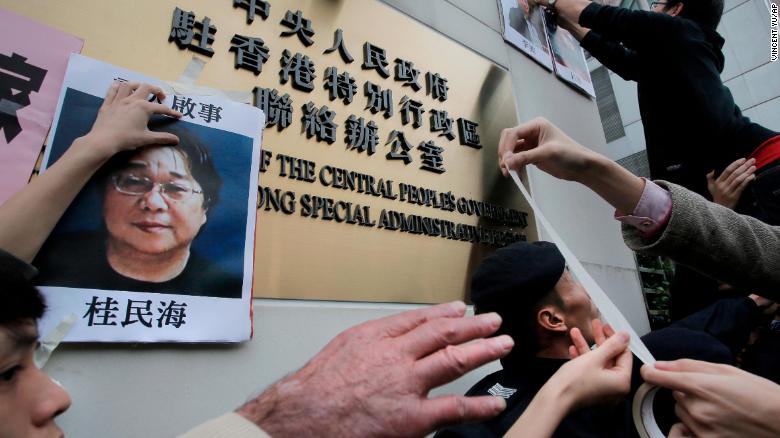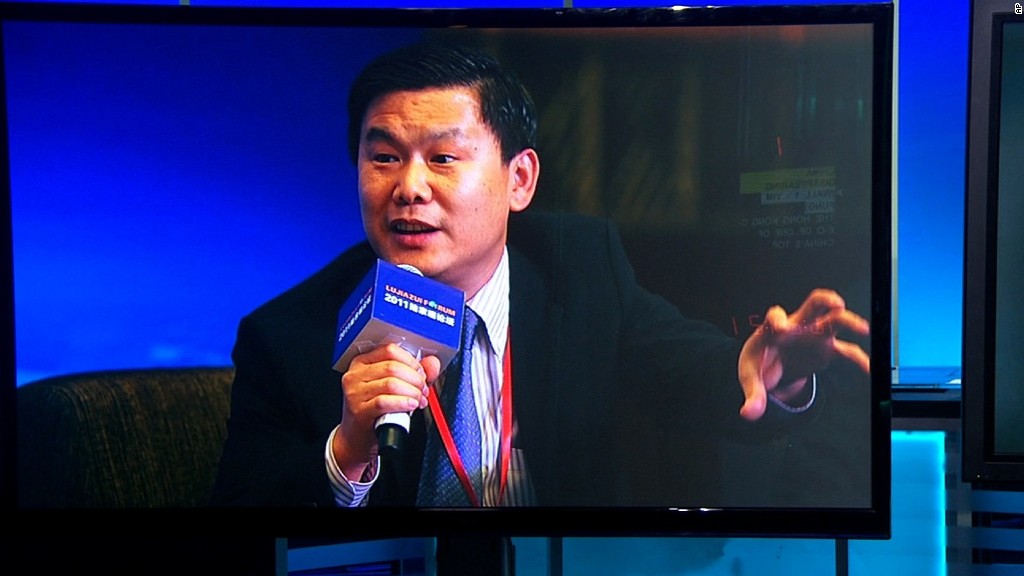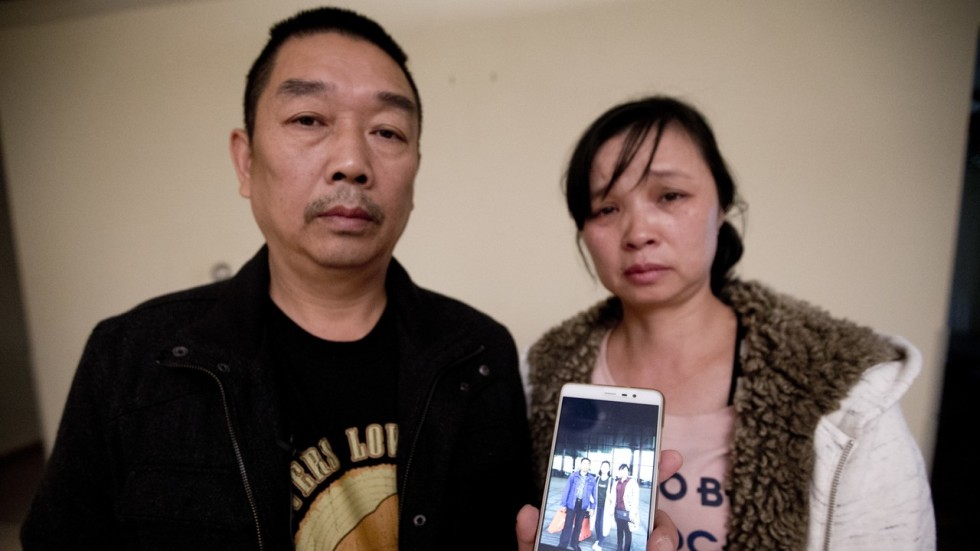THE DISAPPEARED
China’s global kidnapping campaign has gone on for years. It may now be reaching inside Canada and U.S. borders.
Before he disappeared from his luxury apartment at the Four Seasons Hotel in Hong Kong on Jan. 27, 2017, Xiao Jianhua, a Chinese-Canadian billionaire, favored female bodyguards. Why, exactly, was unclear: Perhaps he simply liked being surrounded by women; perhaps he trusted them more than men.
Whatever the reason, those guards weren’t much help when a group of mysterious men showed up at his apartment that January day and took him away. According to anonymous sources who viewed the hotel’s internal video feed and later spoke to the New York Times, Xiao, who may have been sedated, was rolled through the Four Seasons lobby in a wheelchair, a sheet covering his head. He was then reportedly loaded onto a boat and ferried to the Chinese mainland.
In what has become a familiar script for such disappearances, an initial police report filed by a family member was quickly withdrawn, and Xiao later issued a statement denying that he had been kidnapped. More than one year later, he remains in mainland China, and though he has not yet been charged with any crime, his businesses, under government direction, are expected to sell almost $24 billion in investments, which will reportedly be used to repay state banks.
Such stories are not unique. In October 2015, Chinese government operatives kidnapped Gui Minhai, a Hong Kong-based book publisher and bookstore owner, from his apartment in Thailand. Months later, Gui, a Swedish citizen, resurfaced in China, declaring on state television that he had turned himself in to face decade-old drunk driving charges. Gui’s colleague, Lee Bo, a dual Chinese-British national, also appears to have been kidnapped in Hong Kong in December 2015 by Chinese security forces and brought back to the Chinese mainland.
Over the years, the cases have started to pile up. In 2002, Wang Bingzhang, a prominent pro-democracy activist, was seized in Vietnam by Chinese operatives and thrown into prison on the mainland, where he remains to this day. Two years later, another well-known dissident, Peng Ming, was kidnapped in Myanmar and jailed in China; in late 2016, he died under suspicious circumstances in prison.
Now, however, Beijing’s policy of forcibly repatriating people it considers Chinese nationals — some of whom are in fact citizens of other countries — appears to be accelerating. Powerful businessmen, ex-Chinese Communist Party officials, dissidents, and activists have all been targeted as part of what Western intelligence officials say appears to be a large-scale campaign.
These abductions have become prevalent enough that officials at the U.S. State Department are growing concerned — though they have yet to raise the subject formally with Beijing. The issue “is being talked constantly about at the top,” says one current State official, who has asked not to be named because they are not authorized to speak publicly on the issue. The official notes a recent cable focusing specifically on Chinese renditions in Southeast Asia.
China is not alone in such policies. After 9/11, in what came to be known as “extraordinary rendition,” the United States apprehended scores of foreign nationals accused of terrorism, many of whom it then sent to third countries for harsh treatment, including torture — a policy that soon ignited ferocious domestic and international criticism. But China’s kidnappings appear to be almost exclusively focused on current or former Chinese citizens living abroad who are suspected of corruption-related offenses or more nebulous political crimes.
Yet these cases of forced repatriation appear to show just how seriously the Communist Party takes its assertion that anyone it regards as a national — no matter where they live, work, or study — is subject to its authority.
Apart from the scope, what worries Western intelligence officials is that the kidnappings have begun to occur in the territory of core U.S. allies, including some of the Five Eyes intelligence partners (the United States, Australia, Canada, New Zealand, and the United Kingdom). U.S. officials fear that China will soon attempt a kidnapping on American soil. In fact, it may have already done so.
When exactly China launched this renditions program is difficult to pinpoint, in large part because the victims and their families have kept the cases quiet. One of the first cases to spark debate dates to 2005, when Chen Yonglin, a Chinese diplomat who had defected to Australia, accused security forces of having drugged and kidnapped Lan Meng, the son of a former deputy mayor of Xiamen, five years earlier. Lan was allegedly drugged by Chinese security forces and transported from Australia back to China on a state-owned shipping vessel.
Chen, who was assigned to China’s consulate in Sydney at the time of his defection, claimed that Chinese officials abducted Lan in order to force his father, Lan Fu, to return to China from Australia to face criminal corruption charges. (Lan Fu returned to China in 2000 and is now serving a lifelong prison sentence.) Australian officials have contested Chen’s claims, and the alleged victim, like numerous others, apparently denied the story to Australian federal police.
But Chen remains adamant. Reached by phone in Australia, he confirms his account of Lan Meng’s rendition, citing numerous conversations about such abductions with Chinese military, intelligence, and diplomatic officials during his tenure at the Chinese Ministry of Foreign Affairs. He says while in office, he heard of at least one other Chinese-sponsored seizure in Australia, as well as one in New Zealand. Chinese operatives also performed similar kidnappings in Vanuatu and Fiji during this period, he says. (Chen says the New Zealand case involved a woman named Xie Li, who was kidnapped in Auckland in 2004 and returned to China via a state-owned shipping vessel.)
Though Australian officials doubted Chen’s claims when he made them more than 10 years ago, China’s increasingly aggressive and sometimes public repatriations have since made them much more credible. In 2014, Beijing formally announced that it was expanding its anti-corruption campaign, known as Skynet or Fox Hunt, to target officials living broad. As part of this and other efforts, China claims to have repatriated more than 3,000 individuals since late 2012.

Critics dispute Chinese government claims that some of these individuals returned of their own free will. “No fugitive volunteers to come back,” says Huang Ciping, a prominent dissident and the director of the U.S.-based Wei Jingsheng Foundation, a Chinese pro-democracy and human rights nonprofit.
In mainland China, the use of kidnapping and illegal detention has become such a standard part of the Communist Party’s disciplinary procedures that it even has a name, shuanggui. In order to isolate suspects in corruption cases — which are often intertwined with fights among party factions — security officials seize them, hold them in undisclosed locations, and torture them to extract quick confessions. The use of shuanggui has increased sharply since Chinese President Xi Jinping launched his anti-corruption drive.
These techniques are now being applied abroad, and among U.S. allies, Australia seems to have borne the brunt of China’s efforts. The number of suspected kidnappings in that country is approaching double digits and includes multiple cases where individuals were beaten or drugged and then dragged onto a boat destined for China, according to former senior U.S. intelligence officials.
In other instances, Chinese operatives detained individuals in Australia and used threats to coerce them into leaving the country voluntarily, says one former Australian intelligence official. That official places the number of people coerced into returning to China at “significantly” higher than 10.
The Chinese rendition program has also extended to other Western countries. According to a former senior Canadian intelligence official, there have been two known “extreme coercion” cases in the Vancouver area. “If these were not actual kidnappings, they came very, very close to it,” the former official says. Chinese intelligence or security operatives appeared in person and threatened to harm the victim’s family and friends if he or she failed to cooperate. “They grab somebody and walk them onto a plane,” the former official adds.
The former Canadian official describes Chinese operatives using a “carrot and stick” approach: Individuals were promised leniency if they agreed to cooperate and return to China, while those who resisted were subjected to escalating threats. The former official estimates that such cases in Canada have totaled fewer than two dozen, with many focused in the Vancouver area.
The identities and alleged transgressions of the victims remain somewhat opaque. According to one former senior U.S. intelligence official, those kidnapped in Australia had been accused of graft or corruption. But other former U.S. intelligence officials point out that China often employs such accusations as a means to target dissenters or other suspected enemies of the state. And in some cases, at least, the political motivation has been clear. In early 2016, for example, Li Xin, a pro-democracy journalist, was kidnapped in Thailand and returned to China for an unspecified investigation.
The Chinese government will use “every mean” to bring individuals wanted on graft or corruption charges back, says Chen, the former Chinese diplomat. “They will threaten or terrorize people to do it. They might try kidnapping.”
The question that most concerns U.S. intelligence officials, however, is how far the Chinese government would go to repatriate individuals from the United States, where a kidnapping could provoke a serious international incident. According to some former officials, it has already happened.
About five years ago, U.S. intelligence officials began to notice a pattern: Chinese nationals living in the United States were also disappearing. The number of suspicious disappearances at the time was small — fewer than six, one former senior intelligence official says.
China has formal legal channels to retrieve “economic fugitives.” According to a former senior U.S. law enforcement official, Chinese officials about three years ago gave their American counterparts a list of U.S.-based individuals they wanted deported to China. The list, which numbered nearly 200 people and included 15 to 20 individuals in the Los Angeles area alone, tended to “trump up” charges in many cases, says the law enforcement official. China and the United States do not have an extradition treaty, but in 2015, the Department of Homeland Security agreed to enhance cooperation with China on deportation of U.S.-based fugitives.
Yet at least some of the suspected victims in the United States didn’t seem to fit the bill for Skynet or Fox Hunt targets, who are typically wealthy and well-connected economic fugitives. “They were not high-profile folks,” one former senior intelligence official says.
Evidence emerged that the disappeared people had been coerced into leaving the United States under duress, says one of the former U.S. intelligence officials. “There were multiple reports of people observing Chinese intelligence operatives materializing around the schools or residences of the missing people,” the former official says. “One theory was that they were strong-arming them in person, saying, ‘We’re here. Your flight back to China is tomorrow.’”
Suspected kidnapping cases within the United States were never as clear-cut as those alleged to have happened in Australia. Inside the U.S. government, officials argued about the extent of China’s activities within the country and even whether they should be defined as “extraordinary renditions” at all. The cases set off what one former intelligence official calls a “heated” debate among senior U.S. counterintelligence officials about half a decade ago, going all the way up to then-FBI Director Robert Mueller.

The Chinese Embassy in Washington did not respond to a request for comment, and neither did many of the governments whose countries have allegedly been staging grounds for Chinese renditions. A spokesperson for the Australian Federal Police did not respond to questions about renditions but pointed to a prior investigation into the 2000 case, which concluded that the allegations could not be substantiated.
The CIA and the State Department referred questions about alleged cases of forced repatriation to the Justice Department. A spokesperson for the department declined to answer specific questions but provided a general statement appearing to acknowledge the concerns.
“THE DEPARTMENT WILL ASSIST OTHER COUNTRIES IF EVIDENCE OF CRIMINALITY IS PRESENTED, BUT WILL NOT ACCEPT UNILATERAL LAW ENFORCEMENT ACTIVITY BY ANOTHER COUNTRY ON OUR TERRITORY.”
“The U.S. Department of Justice will not allow the United States to become a safe haven for criminals,” the spokesperson wrote in an email to Foreign Policy. “The Department will assist other countries if evidence of criminality is presented, but will not accept unilateral law enforcement activity by another country on our territory.”
One former senior U.S. intelligence official believes that the evidence is “clear and convincing” that these U.S.-based individuals were subject to acute pressure, which included physical threats to their family members within China and was tantamount to rendering them. “Some cases were semivoluntary, other involuntary,” the official says.
The debate touches on the thorny question of what constitutes a kidnapping. Is it drugging someone and assaulting them, or can it include the mere threat of physical violence against a person or his or her family members? “There are instances where you have clear examples of it being more rendition-flavored behavior in the U.S.,” another former intelligence official says.

But one of the senior former U.S. intelligence officials argues that these cases are not “true” renditions — that these only encompass actual kidnappings, such as the Australia cases. “There’s a big difference between kidnapping and pressure,” says the former official, between “kicking in a door and taking a guy forcefully away and saying, ‘Come with us or we’ll kill your family in Inner Mongolia.’”
This same former intelligence official is “adamant” that evidence of such extraordinary renditions within the United States does not exist. It would be a “huge leap” for Chinese intelligence to shift from employing extreme pressure tactics to performing actual hands-on kidnappings in the United States, the former official says. “You want to come to this country and start kidnapping and killing people? Game on.”
“YOU WANT TO COME TO THIS COUNTRY AND START KIDNAPPING AND KILLING PEOPLE? GAME ON.”
There is greater consensus among U.S. intelligence officials, however, that China has engaged in these extreme pressure campaigns, which include outright threats to individuals or their families, in order to compel U.S.-based Chinese nationals to return. One such case, according to the former intelligence officials, involved a Chinese graduate student enrolled at the University of California, Berkeley at the time of their disappearance about five years ago. There was “evidence of this person being taken against their will,” says one of the former intelligence community officials. (Another victim was based in the Pacific Northwest, former officials say, and a third case involved an individual in the Boston area, says one source.)
“We believed that maybe some family member of this person was being held hostage — that was our theory,” another former U.S. intelligence official says of the Berkeley student. “We hadn’t even confirmed that. There was tremendous silence by the Chinese community on this question.”
Another Chinese-born foreign national, speaking to FP about their experience and that of others, was coerced into returning to China from the United States in 2013. This person, who was then based in the Bay Area, agreed to return in part because of threats to their family, including a relative who was tortured in China. After returning to China, the person was held under house arrest for two years.
Their experience was not unique, the person says. Since the anti-corruption purges started in China, the authorities have been after the wives and children of targets who are residing abroad. “They triangulate between the mother, the father, and the child,” says this person, who holds citizenship in a Western nation. “Most of the time you can’t reach your parents, so you’re on your own, completely isolated.”
THE CHINESE GOVERNMENT ALTERNATES BETWEEN VAGUE THREATS AND APPEALS TO CONSIDER FAMILY. “THE PHRASING THEY USE — EITHER TO FORCE YOU BACK OR TO GET YOU TO GIVE INFORMATION WHEN YOU'RE BACK — IS, ‘IT WOULD BE BEST FOR YOUR FATHER IF YOU DID THIS,’ OR ‘DON'T YOU WANT THE BEST THING FOR YOUR FATHER?’”
The Chinese government alternates between vague threats and appeals to consider family. “The phrasing they use — either to force you back or to get you to give information when you're back — is, ‘It would be best for your father if you did this,’ or ‘Don't you want the best thing for your father?’” the person says. Often, the Chinese government operatives will also try to appeal to the person’s patriotism. “They’ll say, ‘You’re Chinese, don’t you want to help the motherland?’ And when they want to intimidate or bully you, they say, ‘You're too American, you don't understand how things work in China.’”
If that doesn’t work, however, the government will switch to tougher tactics. “With most people, threats and imprisonment were enough,” the person says, “but with the really hard men, they tortured, or threatened to torture, the wives and relatives.”
China’s use of kidnappings has intensified over the past decade, according to Huang, the U.S.-based dissident. “They have been very aggressive,” she says. Fear is widespread within dissident circles, says Huang, describing one of her U.S.-based contacts who has been subjected to a coercion campaign. This person, whose husband has already been jailed in China, declined to speak with FP, even under the condition of anonymity.
Religious and ethnic minorities have also been targeted. According to Ilshat Hassan, a Virginia-based Uighur activist who fled China in 2003, a police officer in China called him in the United States multiple times in 2009 and 2010, offering blandishments — and thinly veiled threats — in exchange for Hassan’s return to China. He refused, threatening to call the FBI. (In another, non-U.S. case, a Uighur man studying Islamic theology in Egypt was coerced by officials at the end of 2016 to return to China with his wife, says a close relative of this individual, who currently lives in Europe. When he and his wife returned to China, they were both arrested and imprisoned.)
How to define these cases — as instances of extralegal repatriations, extreme coercion, or even sometimes as extraordinary renditions — is open to debate, but intelligence officials watching the issue say these actions signal a future where China is emboldened to unleash its security apparatus abroad, even on U.S. soil.
In January, Jerry Chun Shing Lee, a former CIA officer with extensive experience in Beijing, was arrested after landing in New York. Lee, who left the agency in 2007, was charged with mishandling classified information. Though he hasn’t been charged with any espionage-related crimes, Lee is suspected of providing the government in Beijing with information about the CIA’s constellation of China-based assets, one of the worst breaches for U.S. intelligence in decades.
But Lee’s alleged recruitment may have also led Beijing’s operatives to U.S.-based Chinese nationals. According to three former officials, the intelligence community is looking at whether Lee’s disclosures led to the arrest, and possible execution, of a U.S. intelligence asset who voluntarily returned to China from the San Francisco area. And, in another case, a U.S.-based individual who had been in contact with the CIA while still living in China was coerced into returning there, one former senior official says.
China’s pursuit of its nationals in Western countries points to a larger policy that isn’t likely to stop at U.S. borders. In a recent address to the National Party Congress, Xi emphasized the government’s global reach over the Chinese diaspora. “We will maintain extensive contacts with overseas Chinese nationals, returned Chinese, and their relatives and unite them so that they can join our endeavors to revitalize the Chinese nation,” he said.
If true, these renditions or forced repatriations are “precisely the kind of behavior that observers said would generate pushback against China's actions,” says Peter Mattis, a fellow in the China program at the Jamestown Foundation. “It hasn't. And Western governments have looked the other way.”
The real question may be what happens when China’s assertion of extraterritorial jurisdiction collides more acutely with U.S. notions of territorial sovereignty. One former senior intelligence official, who is “skeptical” that the U.S. cases rise to the level of extraordinary renditions, is unsettled nevertheless. Just because Chinese security operatives haven’t attempted kidnappings within the United States “doesn’t mean they won’t eventually,” the official says.
For Chen, the former Chinese diplomat in Australia, the issue comes down to Beijing’s willingness to flout international convention when it suits its purpose.
“That’s the regime,” he says. “You don’t know what else will happen.”





















No comments:
Post a Comment
Comments always welcome!